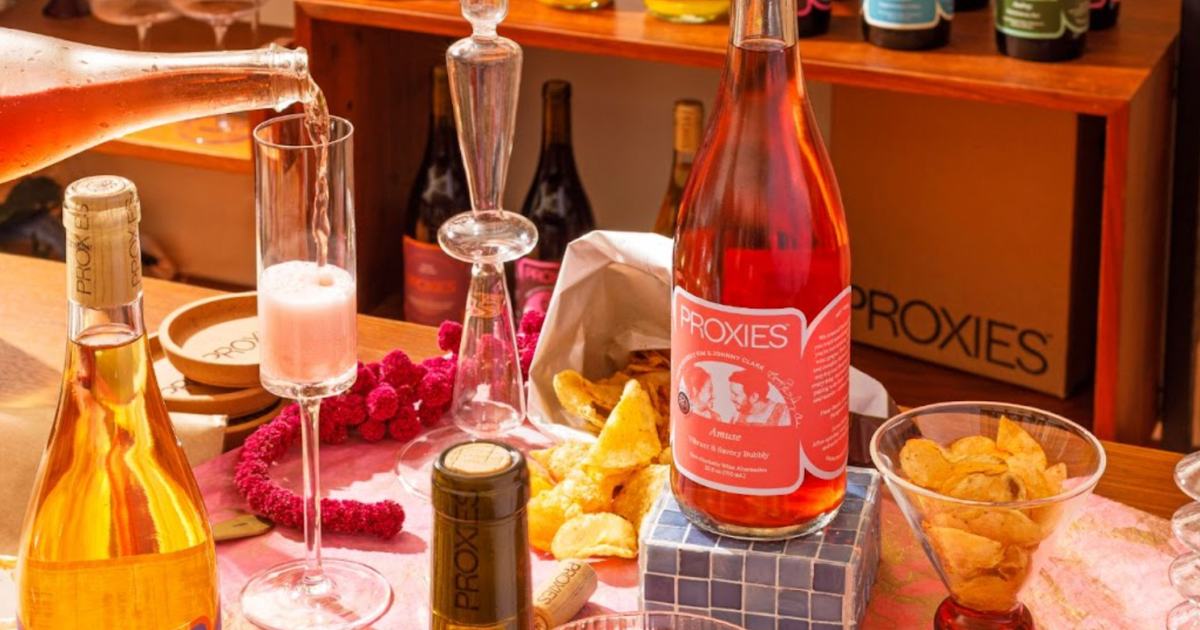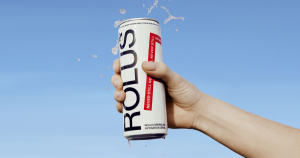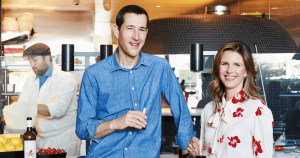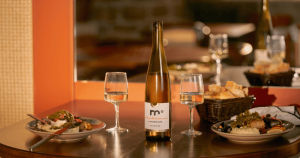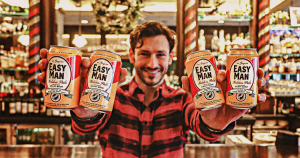By Charlie Friedmann, Co-Founder and President of Proxies
“Not wine. Proxies.” This simple phrase is our most-used slogan at Proxies, the brand I co-founded in 2021. But if Proxies aren’t wine, does that mean they’re not non-alcoholic wine either?
It depends on who you ask. Lately, I’ve noticed that many in the NA space seem to want to draw a categorical divide between dealcoholized wine and wine alternatives like ours that are built from the ground up. I don’t think we should.
What is non-alcoholic wine?
What is non-alcoholic wine? And what should it be? These questions are at the core of everything we do, and every blend we make at Proxies.
Typically, non-alcoholic wine is made by first making wine, then dealcoholizing it. Removing the alcohol from something people already know and like sounds like a good idea in some ways, but it’s not so simple. Only a handful of specialized factories in the world have the equipment to do this, so that means shipping your finished wine to one of them and paying them to remove the alcohol and package your product (or just white labeling something they already make), adding a bevy of costs and environmental impact at once. To mitigate those costs, the vast majority of dealcoholized wine starts with pretty mediocre wine.
But even if you start with good wine, you’re losing a lot more than just the alcohol. Alcohol makes up 12-15% of wine, and with it comes body, structure, aromatic volatility, balance, integrated flavors, and all the other things that make good wine so special. Remove the alcohol—no matter the fancy method—and the result is no longer the wine you know and love. At least we have yet to find one that worked for us. If we had, we never would have gone through all the effort of making Proxies in the first place.
Building from the ground up
Proxies, by contrast to traditional NA wine, are built from the ground up with wine grapes, fruits, spices, premium teas, natural botanicals, and more in an effort to create a beverage with the core characteristics of wine—the body, spice, acidity, tannin, texture, balance, and complexity that make it a great pairing with food. We do things differently. But does that make us any less of a non-alcoholic wine?
Our friends here at Dry Atlas are among those who put us in a separate category—often coined Wine Proxies (a term we really created) and used to group together a number of brands making a whole host of liquids to serve the wine occasion. This group includes sparkling teas, fancy kombuchas, products like ours, and everything in between. Often, people suggest that one method ends up tasting more “like wine” than the other, but is that even right? Should we be splitting the world of non-alcoholic wine into two categories based on production method, or should we instead differentiate between actual brands and products?
We make Proxies the way we do because we think it’s the best way to make a non-alcoholic wine-like beverage. Full stop. NA beers are made in many different ways—dealcoholizing, arrested fermentation, Proxies-like blending—but we call them all NA beer. So why not the same in wine?
What matters to consumers?
Some products made more like ours certainly skew further from traditional wine—including some we’ve made—but others are much closer to the complexity, aromatics, texture, flavor, and overall wine experience. We’ve spent three and a half years making 100 different Proxies precisely so we could find the path to making the best replacement for wine sans alcohol. Whether we call one of the few dealc producers in the world, make it from the ground up, or some combination thereof ultimately shouldn’t matter, and likely won’t matter to most consumers.
There are good dealcoholized wines and bad products made with somewhat similar techniques to ours (some of the 100 blends we’ve made definitely qualify!). But ascribing a certain quality to one method or suggesting that one method tastes “more like wine” is frankly just kind of reductive and lazy.
Do Proxies taste like wine? Do dealcoholized wines taste like wine? Does wine always taste like “wine”? There are thousands of types of wine and countless variations in flavor. And yes, not many are likely to have the same notes of yuzu, peach, and fennel as our sparkling Gold Crush, but the best of them do share the same bright aromatics, full texture, biting acidity, long finish, and ability to pair with food.
Looking ahead
In a couple of months, we’ll release a new still red blend that I’d put up against any non-alc red—and many traditional red wines—in terms of “wine-like” character. It’s dry yet full-bodied, tannic and savory yet full of dark red fruit, and features truly integrated and complex aromatics. It’s non-alcoholic wine the best way we know how to make it, and it will make my point better than I ever could here.
The question is, what do you actually want to pour into your glass when you sit down for dinner?
About the author
Charlie Friedmann is the Co-Founder and President of Proxies, one of the pioneering brands in non-alcoholic wine. Led by their collaborations with top chefs and sommeliers like André Mack, Dominique Crenn, and Sean Brock, Proxies have become a leading force in the culinary world and are poured at many of the top restaurants in North America, including Alinea, The French Laundry, Oriole, and Crown Shy.


